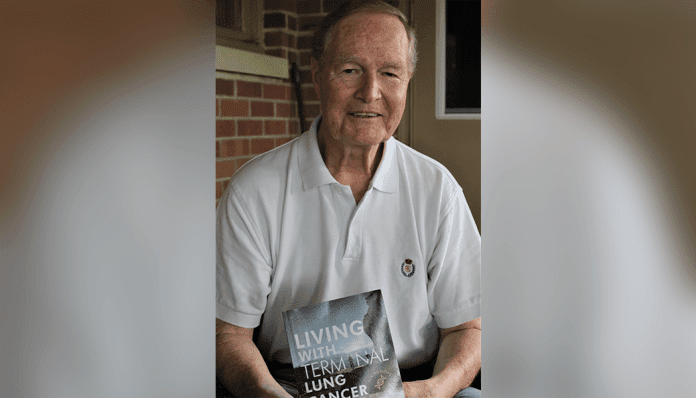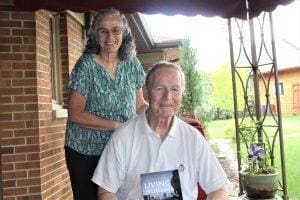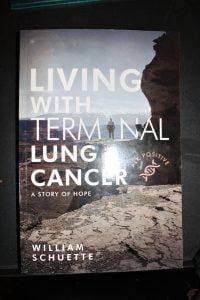
VERSAILLES–Retired school administrator/coach Bill Schuette has penned his second book, which he has entitled “Living with Terminal Lung Cancer.”
His first book, “White Blaze Fever,” published in 2003, featured his experiences along the trail, and his second book is focusing on what has been going on in his life for the past 16-plus years.
Yes, he hiked the Appalachian Trail’s 2,167-mile trek, in 2000, walking from Springer Mountain, Ga., to Mount Katahdin, Maine, all the while encountering bears, moose, snakes, and other wildlife along the way.
He was diagnosed with Adenocarcinoma, non-small cell lung cancer, in 2007.
“Fortunately for me, I am one of 5 percent who have a change in my ALK gene that they have treatments for it. ALK stands for Anaplastic Lymphoma Kinase,” according to him.
What were his symptoms?
“When I would breathe real deep, I felt a chest pain,” he said. “I was still involved with athletics at the time. I went to a pulmonologist in Piqua and he said I had healthy lungs.”
It was at this time that he became proactive.
Before going on a trip to Florida with his wife Connie, he learned about smoker CT scans being given at Reid Hospital in Richmond, Ind.
He decided to take part before leaving on their trip.
It was while they were gone that he learned from his family doctor the bad news, “You have a cancer in the chest that has metastasized and is Stage IV throughout the body.”
Bill immediately called Cleveland Clinic.
“In June 2009, the doctor told me I wouldn’t see Christmas. In two years, I had different doctors doing seven different chemos. They told me I was dying. A doctor in Indianapolis had no answers either,” he recalled.
Life changed with that diagnosis for the Schuettes.

He was devastated and even sought more opinions from other areas and specialists.
“I had never smoked,” he said. “I remember them giving me six months to a year and say ‘There is nothing we could do.'”
So chemotherapy was in order.
“The bottom line was I was doing seven different chemos over two years,” he said.” It took me to my knees.”
Despite what he was going through, life apparently had other plans for Bill.
He recalls lying on his couch in his Versailles home and watching the news on TV one evening.
“There was a young lady on there,” he said. “She had the same thing I had and she said, ‘It’s melting away.’ I went to the computer to look it up, but didn’t find that segment.”
A day later, he found it and read the entire news segment that had aired. With that, he was able to locate the doctor’s name, Dr. Alice Shaw, and the hospital, Massachusetts General Hospital, now known as Mass General Brigham.
Bill said he immediately sent off an email to his oncologist in Indianapolis to share what he learned on that news segment.
“My Indianapolis doctor had actually been at that conference where the study results were featured and the news clip was filmed,” Bill said.
If Bill was interested in getting into the clinical trial, he was told to go for it.
After emailing Dr. Shaw, he immediately got a reply. They conversed with her receiving Bill’s information and it resulted in him subsequently getting the okay to participate in the clinical trial.
“After the first diagnosis, I was basically told to go home, get my affairs in order and do what I want to do.,” he said. “Everybody in the world knows about this drug now.”
“We have been to Boston 92 times,” Connie said. “They have a Hope Lodge and an apartment building close by and we stayed in all of those.”
“As time went on, we were able to do a lot of exploring of Boston, one of the most wonderful cities,” he added.
He also noted that not long after that first dose of the new drug, he began to feel better.
“There is no cure for this lung cancer,” Bill said. “They use the word ‘stable’ when talking about my condition.”
The drug he now takes is expensive, and he will be on it for a long time. Medicine is sent to him once a month, and he still visits Dr. Shaw once a year in Boston.
“Twice a year, I visit my doctor in Troy,” Bill said. “He asks me more questions than I do him,” Bill said.
His first book took him a year to write, while this second book took two years.
Bill did his own research and Connie took notes at his doctors’ appointments, and they consolidated all this information to make this book happen.
“I wanted to give other cancer patients hope and used ‘terminal’ in the title,” he said “I’m probably one who has lived this long with this kind of cancer.”
He said the purpose of writing his latest book was to give other people hope, and he sure has a lot of information to convey to them in the 220-page, 20-chapter book. There are a lot of ups and downs during his journey, and they are all in his book.
“Writing this book was a process which took a long time,” he said. “It was my way of therapy.”

Throughout his journey, he made a concerted effort to explain the specifics of his cancer to others afflicted with the dreadful terminal disease. He explained that “Living with Terminal Lung Cancer” is a story of what can happen when the will to live collides with modern-day research.
“Be assured the reason I am still living with a terminal diagnosis 16 years later is that I am a powerful advocate fighting to live,” he said. “Every person impacted by cancer understands the need for hope.”
Will he be writing any more books?
“Not for a while,” he smiled. “I would like to get this book out to lung cancer patients.”
On the cover of his new book is Schuette photographed on a camping trip while visiting Canyonlands in Utah in 2016.
“That was one of our biggest accomplishments,” said the 74-year-old, who indicated they will still travel.
Those interested in purchasing his book can go through Amazon and Barnes and Noble. When searching for his books, people are urged to search “William Schuette.” Via Facebook, he is a member of the ALK Positive support group specifically for Anaplastic Lymphoma Kinase positive lung cancer patients and their immediate caregivers (and select others as determined by the administrators).
The site, it was noted, is not intended nor recommended as a substitute for medical advice, diagnosis, or treatment.
“Always seek the advice of your own physician or other qualified health care professional regarding any medical questions or conditions,” it read. “We warmly welcome all new members. We are all here to get through this storm together! We truly hope that this group will help patients/survivors and their loved ones.”
The book was dedicated “to wife Connie, without whom this book would never have made it to press. Her support and encouragement were paramount from inception to the finish line.”
The Schuettes, who have purchased a new travel van, had visited a couple of the national parks before his diagnosis with cancer. They completed the last visit of the 63 national parks in March this year.
His advice to people having cancer? “Get a physical, a biopsy and they can tell you what you have. It saves lives. I have been a guinea pig for many years, and I have been able to help local people. Pfizer has been great.”





